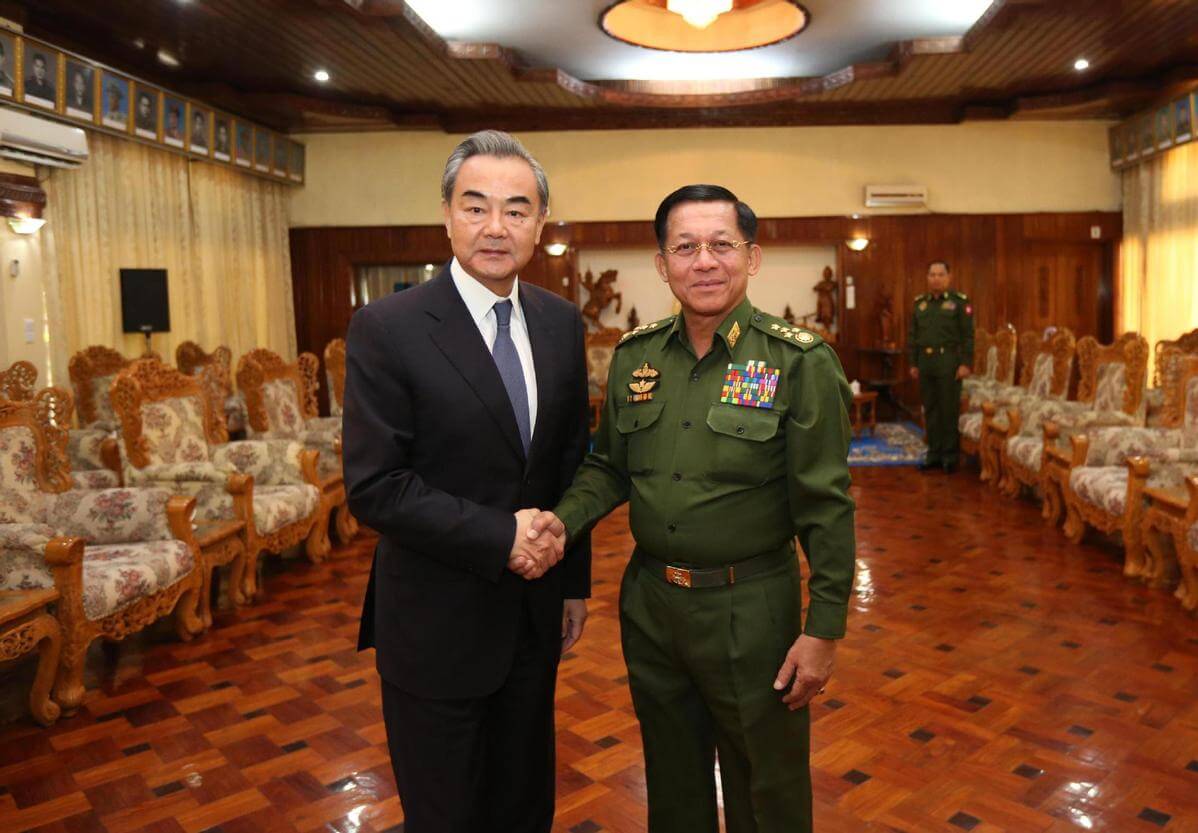During the first high-profile visit to Myanmar by a Chinese official since last year’s coup, Foreign Minister (FM) Wang Yi called on the junta to restore peace, stability, and democracy.
Wang, who is currently in Myanmar to chair the seventh Lancang-Mekong Cooperation Foreign Ministers’ Meeting, met with the Cambodian Deputy Prime Minister and Foreign Minister Prak Sokhonn in Bagan on Sunday. Prak is also the current Special Envoy of the Association of Southeast Asian Nations (ASEAN) for Myanmar. In the meeting, Wang expressed appreciation for Cambodia’s “active role in mediating the Myanmar issue” since taking over the grouping’s rotating chairmanship and laid out Beijing’s “Three Expectations for the Settlement of the Myanmar Issue.”
Firstly, China, along with the help of ASEAN, hopes to push Myanmar towards “continuous political reconciliation within the framework of the constitution and laws.” In this regard, Wang said that all political parties of the country must be encouraged to prioritise the interests of the citizens and should consider the “reasonable demands” of all parties involved, “so as to restore stability and achieve peace at an early date.”
Popular News says China foreign minister Wang Yi has arrived in Bagan
— Leong Wai Kit (@LeongWaiKitCNA) July 2, 2022
Wang Yi is #Myanmar to attend regional talks on Lancang-Mekong issues pic.twitter.com/2nqqwCWZlE
Wang added that China’s second expectation is to resume the country’s “democratic transition process, realise the vision of returning power to the people, and explore a path of political development.”
Lastly, Wang said that China hopes ASEAN will “stay committed to the basic principles and traditions of non-interference in internal affairs,” continue engaging in “patient coordination,” and “constructively implement” the “five-point consensus” that was decided last year by member countries, and “safeguard the overall solidarity and leading role of ASEAN.”
Wang Yi in #Bagan.#China is giving the craven and dastardly message, "Might is Right," by legitimizing the brutal military's attempt to rule using armed power!
— Thinzar Shunlei Yi (@thinzashunleiyi) July 2, 2022
What is happening & what's going to happen in #Myanmar depends on how we are treated by our powerful neighbors. pic.twitter.com/iAzg2KGpsS
Cambodia’s ASEAN presidency has been marked by a softer approach to Myanmar. In a rare move, the group decided to ban the entry of political representatives from Myanmar at ASEAN meetings until it restores peace and democracy. ASEAN’s decision was based on the junta’s “insufficient progress” in abiding to the five-point peace roadmap reached by the Association last April.
In contrast, Cambodian Prime Minister Hun Sen offered his support for Myanmar’s participation at ASEAN meetings. “It’s a family member of ASEAN, they must have the rights to attend meetings,” he said. He also became the first foreign leader to visit Myanmar since the onset of the military coup on February 1, 2021.
Wang Yi met #Myanmar FM on July 3, stressing the China-Myanmar Pauk-Phaw friendship was cultivated by the older generation of leaders of the two countries and is rock-solid and unbreakable. pic.twitter.com/EsnpJmTRVM
— Caoli 曹利 (@Cao_Li_CHN) July 4, 2022
#China's Foreign Minister Wang Yi starts his #ASEAN visits. At the first leg of the trip, he has arrived in #Myanmar for a Lancang-Mekong Cooperation meeting. pic.twitter.com/vWB8CiVplo
— libijian李碧建 (@libijian2) July 4, 2022
The topic of Myanmar is expected to form a central part of Chinese diplomacy during the coming weeks, as the FM is scheduled to participate in several regional cooperation events and travel to a host of ASEAN nations. Wang is currently in Myanmar to chair the seventh Lancang-Mekong Cooperation Foreign Ministers’ Meeting. Next, he will travel to Indonesia to participate in the G20 Foreign Ministers’ Meeting. The FM will also pay an official visit to Thailand, the Philippines, and Malaysia. He is also set to host the second Meeting of China-Indonesia High-level Dialogue Cooperation Mechanism, chair the 14th Meeting of the China-Vietnam Steering Committee for Bilateral Cooperation, and the sixth Meeting of China-Cambodia Intergovernmental Coordination Committee.
Chinese Foreign Ministry Spokesperson Zhao Lijian said during his regular press conference on Friday that the foreign ministry’s series of engagements in the region is due to their “vast common interests.” He added that through the Southeast Asia tour, Beijing hopes to: “deepen strategic communication” with its four Southeast Asian partners; promote Belt and Road cooperation; bring peace, safety, and security to the region; and “get the China-ASEAN Comprehensive Strategic Partnership off to a good start.” Zhao added that China will work jointly with regional partners “to advance the implementation of the Global Development Initiative and the Global Security Initiative” and strengthen economic recovery.

